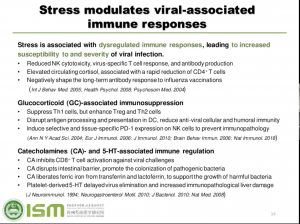In this IUIS Webinar “Yuting Ma discusses the impacts of psychological stress on virus-associated immune responses”
Yuting began her webinar describing the 3 stages of COVID-19: asymptomatic, mild-moderate and severe COVID-19. She further highlighted the absence of a gold standard for treating COVID-19. As a result, the most effective countermeasures include preventing transmission, stimulating anti-viral immunity and/or dampening inflammatory immunity depending on the stage of infection. She further highlighted that in addition to pathology caused by the COVID-19, the pandemic also induces psychology stress particularly in medical professionals and COVID-19 patients. Additionally, healthy individuals also experience pandemic-induced psychological stress due to social, economic and financial challenges. It is well recognised that stress levels can also affect bodily functions including metabolic and immunity pathways (see below). She presented data from a murine stress model, that demonstrated that stressed mice have a lower capacity to induce viral-specific T cell immunity and lower B cell activation than non-stressed mice. She further demonstrated a stress-induced effect of stress on the gut bacteriome and virome, as well as metabolic dysfunction. Factors that can all contribute to dampened immunity.











